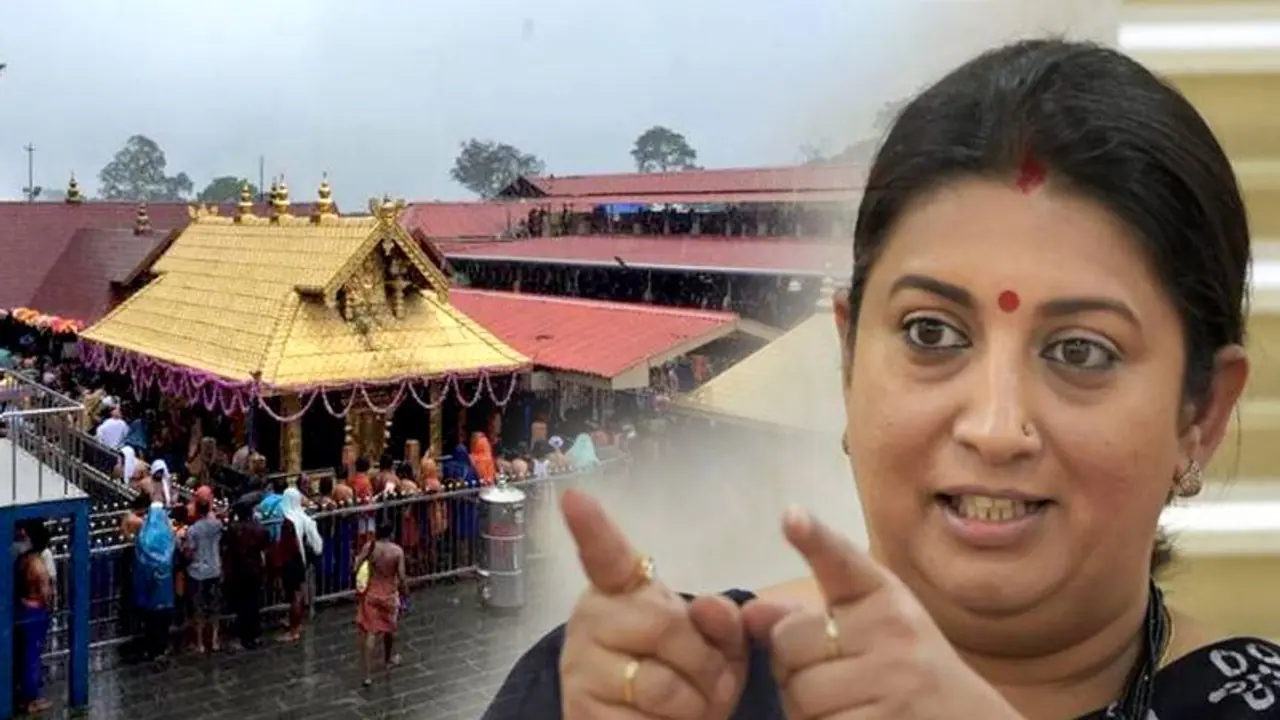Smriti Irani said that religious practices should be "respected" and anyone breaching them just to 'make headlines' would do a great disservice to the country's diversity.
New Delhi: Union Minister Smriti Irani spoke on Sabarimala on Friday during an event organised at the Delhi University campus. While addressing the students in the campus, she said that the right to pray did not mean the right to desecrate.
The verdict of the apex court on September 28 allowing the entry of women of all age groups into the famous shrine had made Sabarimala a battlefield. Women of all ages should be allowed in Kerala's renowned Sabarimala temple, the Supreme Court ordered, ending the age-old ban.
Smriti Irani said that religious practices should be "respected" and anyone breaching them just to "make headlines" would do a great disservice to the country's diversity.
"I speak from personal experience. And I said that publicly when I made that comment. I am married to a Zoroastrian, who is a Parsi, and by law, I am not allowed (to enter fire temple). And, 'by law' means not by the Constitution, but by laws that govern that particular religious practice," she said.
"Irrespective of how empowered I am, I am not allowed to enter a fire temple," Irani told a gathering of students at a business conclave event at Shri Ram College of Commerce here.
The textile minister said her earlier comments on the issue was to tell that there are religious practices across different communities
"I have not gone to the Supreme Court, to tell the Supreme Court to give me the power to barge into a fire temple, because I respect the religious beliefs of the community that I am associated with," she said.
Smriti Irani was asked why should there be a blanket restriction on women's entry to the Lord Ayyappa temple in Sabarimala, over objections from certain quarters.
"It is incumbent upon you to respect that religious practice because the Constitution gives us rights to be free, but it also impinges upon us responsibilities towards fellow citizens," she said.
Irani said there are "many temples" across the country, where "men are not allowed".
There are many churches, many mosques where restrictions are imposed for religious practices to be undertaken, she said.
As individuals, it is our responsibility, given the diverse nature of communities in our country, to respect those tenets, and those practices, the minister added.
"Do we breach practices only because we seek to make headlines or do we talk about only and only matters of faith. And, that is where my comments came from," she said.
"That if I breach somebody's religious practice only because my face will be in the newspaper, then I do great disservice to the diversity of India," Irani said.
On September 28 last year, a five-judge Constitution bench of the Supreme Court, headed by then Chief Justice Dipak Misra, lifted the ban on entry of women of menstrual age into the shrine.
Amid protests against the Supreme Court order opening the temple to women of all ages, Irani had in October said that the right to pray did not mean the right to desecrate.
"I am nobody to speak against the Supreme Court verdict as I am a serving Cabinet minister. But just plain common sense is that would you carry a napkin seeped with menstrual blood and walk into a friend's house? You would not," she had said then, adding, "And would you think it is respectful to do the same when you walk into the house of god? That is the difference. I have the right to pray, but no right to desecrate. That is the difference that we need to recognise and respect."
Besides, the minister was asked about the allegation that the BJP-led government hid important unemployment statistics, which purportedly led to the resignation of key people in the National Statistical Commission.
"I am happy that you asked this question because it gives me a sense of the distortion that is being done amongst people with regards to...fake news," Irani said in response.
The minister referred to initiatives such as the Rs 6,000-crore package to apparel manufacturers, 1.3 crore homes built by the present government, 1.7 crore capital assets built across the country by the present government through MNREGA and the plan of building 1 lakh wellness centres across the country to counter the lack of job creation narrative.
"If you look at the figures, they speak for themselves...," Irani said.
The minister claimed that before the present BJP-led government assumed office, rural job guarantee scheme MNREGA was used so that doles could be given out and no capital assets could be built for the country.
"We insisted that you build capital assets. And as compared to previous government where only 20 lakh such assets were made, we ensured that 1.7 crore capital assets are built by those very fellow citizens, who were part of a pre-existing opportunity," said the minister.
